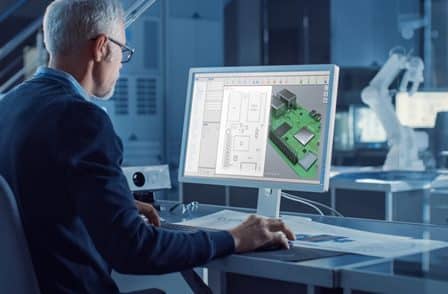Course Overview
The Master of Engineering (Electrical Systems), developed by electrical and renewable energy experts, will equip you with the necessary skills and knowledge to address the demands of the modern power industry. You will learn how to design the components of a power system including generation, transmission, distribution and the associated systems. The program will also cover the automation, protection and control components that contribute to the high level of reliability expected from modern power systems.
This course is internationally recognized under the Washington Accord
(recognized from the Perth campus only).
Program Details
The rapid development of the renewable field has led to a shortage of fully skilled electrical engineers who are competent in both classic power system operation and renewable system integration.
The program presents the widely used wind and solar energy as centralized and distributed power sources as well as the effects of renewable integration on classic power issues. You will also learn energy storage as an integral part of a microgrid or at a larger utility level. You will get the opportunity to understand the use of artificial intelligence and machine learning as data-driven approaches in smart grids with the application of smart meters. The section on project management provides the skills required for effective management of power generation, transmission, and distribution projects.
The Project Thesis, the capstone of the program, requires a high level of personal autonomy and accountability, as it reinforces the knowledge and skill base developed in the previous units. As a significant research component of the program, this project will facilitate research, critical evaluation, and the application of knowledge and skills with creativity and initiative, enabling you to critique current professional practice in the electrical engineering industry.
You must complete 48 credit points comprising twelve core units and one capstone thesis. There are no electives in this program. The program duration is two years, and We deliver units over two semesters per year, and you will take four units per semester. There will be a short mid-semester break and extended breaks between semesters.
Year One
| Semester | Unit Code | Subjects | Credit Points |
| MEE501 | Power Generation | 3 | |
| MEE509 | Transmission and Distribution Systems | 3 | |
| Semester 1 | MEE513 | Electric Power System Analysis | 3 |
| MEE510 | Power Conversion | 3 | |
| MEE512 | Power System Safety and Protection | 3 | |
| MXX507 | Professional Engineering Management | 3 | |
| Semester 2 | MEE511 | Renewable Energy Systems | 3 |
| MEE514 | System Stability Analysis | 3 | |
Year Two
| Semester | Unit Code | Subjects | Credit Points |
| MEE606 | Substation Design and Automation | 3 | |
| Semester 1 | MEE607 | Power Quality and Mitigation | 3 |
| MXX501/601 | Engineering Practice and Key Research Methods | 3 | |
| Semester 2 | MEE605 | Smart Grids | 3 |
| ME700 | Project Thesis (taken over 2 terms – equivalent to 4 units) | 12 | |
Additional Mandatory Units
| Unit Code | Subjects | Credit Points | |
| BXX001-004 | Hands-on Workshop 1 Hands-on Workshop 2 Hands-on Workshop 3 Hands-on Workshop 4 |
0 | |
| MXX001 | Professional Practice Hands-on Workshop | 0 | |
| MXX510 | Professional Experience | 0 |
*Applicable to students gaining entry under option 1) or 4) of the Entry Requirements.
Graduate Diploma of Engineering (Electrical Systems)
Students who elect to exit the program after successfully completing all of the first-year units, as outlined above, can opt to receive EIT’s Graduate Diploma of Engineering (Electrical Systems). If students wish to finalize the Master qualification after exiting at Graduate Diploma level, they will need to re-enroll in the program and relinquish the Graduate Diploma testamur.
Rules of Progression
You can only attempt the Project Thesis once you have successfully completed all other units. All engineering disciplines are built up of individual bodies-of-knowledge that together target a specific application. It not only relies on the combined body of knowledge from the undergraduate degree, specifically mathematics, physics, and discipline knowledge, but also on the various units that form this program. The ‘500’ level units are designed at the Australian Qualifications Framework level eight (Graduate Diploma). The knowledge from each unit allows you to be able to investigate challenging problems, analyse and synthesize complex solutions, and communicate your solutions and ideas. This will enable successful progress to the ‘600’ level units at the Australian Qualifications Framework level nine (master’s degree). All this knowledge is brought together as you tackle complex application problems in your final thesis. The content of each unit is designed to provide a graduated increase in knowledge and skills from the ‘500’ level units to the ‘600’ level units culminating in a Project Thesis. All units must be passed, or have exemptions, to achieve the qualification. The Graduate Diploma of Engineering is nested within the master’s degree as an exit point only after the successful completion of all the ‘500’ level units of the program. Both qualifications have the same entry requirements. The second year of the master’s degree does not serve as an entry point.
Work-Integrated Learning
EIT’s Master of Engineering programs require students to undertake 240 hours of paid or unpaid professional work-integrated learning. This can incorporate paid or unpaid internships, site visits, contributing to industry projects, and networking activities. In undertaking an internship, students will interact with employees and become exposed to organizational policy and culture. You will familiarise yourself with organizational communication procedures, a variety of engineering disciplines, and obtain insight and practical aptitude in projects from the planning phase to completion. If you already have some work experience in the relevant engineering field, you may apply to have credit granted by completing the associated recognition of prior learning form.
Graduates of this program will be able to:
- Demonstrate sound fundamental understanding of the scientific and engineering principles and apply underpinning natural, physical and engineering sciences, mathematics, statistics, computer and information sciences to solve problems in electrical systems engineering.
- Apply in-depth as well as broad understanding of the relevant specialist body of knowledge within the electrical systems engineering discipline including: fundamental power generation and power system design principles; evaluation power system safety and protection; assessing smart grids; power stability and operational analysis; substation automation and systematic project management.
- Reflect critically on a broad body of engineering knowledge to plan and execute an electrical systems engineering research based project, with awareness to knowledge development and research direction within the engineering discipline.
- Draw on the knowledge of engineering design practice and understand the scope, principles, norms, accountabilities and bounds of sustainable engineering practice in the electrical systems engineering discipline.
- Apply systematic approaches, design processes and established engineering methods, tools, techniques and resources, underpinned by hazard and risk framework considerations to conduct and manage electrical systems engineering projects.
- Communicate effectively technical ideas, design concepts or research results to a diverse audience.
- Ability to recognise and pro-actively engage in ongoing professional development and lifelong learning, as well as develop creative and innovative solutions to engineering problems.
- Demonstrate professional use and management of information.
- Apply discipline and professional knowledge and skills to demonstrate autonomy, adaptability and responsibility as a professional engineer.
- Ability to work as a member of a cross disciplinary team in a manner consistent with ethical and professional standards.
Master of Engineering (Electrical Systems) – Mapping of Program Learning Outcomes with Graduate Attributes and Engineers Australia Stage 1 Competencies for Professional Engineers.
To gain entry into this program, we require applicants to hold:
- A recognized 3-year bachelor degree* in an engineering qualification in a congruent** field of practice; OR
- An EIT Bachelor of Science (Engineering) degree* in a congruent** field of practice; OR
- A 4-year Bachelor of Engineering qualification (or equivalent) that is recognized under the Washington Accord or by Engineers Australia, in a congruent**, or a different field of practice at the discretion of the Admissions Committee; OR
- A 4-year Bachelor of Engineering qualification (or equivalent)* that is not recognized under the Washington Accord, in a congruent** field of practice to this program; AND
- An appropriate level of English Language Proficiency equivalent to an English pass level in an Australian Senior Certificate of Education, or an IELTS score of 6.0 (with no individual band less than 6.0), or equivalent as outlined in the EIT Admissions Policy.
* With integrated compulsory twelve-week professional industry experience, training or project work of which six weeks are directly supervised by a professional/eligible professional engineer as determined by EIT.
** Congruent field of practice means one of the following with adequate Electrical Engineering content (fields not listed below to be considered by the Dean and the Admissions Committee on a case-by-case basis):
- Electrical engineering
- Power engineering
- Electronic and communication systems
- Industrial automation
- Instrumentation and control
- Mechatronic systems
- Renewable systems
- Energy management systems
- Signal processing
English
All higher education students studying on campus must complete an English proficiency test during orientation week. If you fail the initial test, you must complete additional English language support classes. If you fail again, you will be considered a student at risk and managed in accordance with EIT’s Student at Risk Policy.
Please note: Meeting the minimum admission criteria does not guarantee entry to our programs. All applications will be assessed on a case-by-case basis.
For full current fees in your country go to the drop down filter at the top of this page or visit the Fees page.
Payment Methods
Learn more about payment methods, including payment terms & conditions and additional non-tuition fees.
Like all Australian higher education providers and universities, EIT programs are accredited by the exacting standards of the Australian Government’s Tertiary Education Quality and Standards Agency (TEQSA).
The Master of Engineering (Electrical Systems) degree is fully accredited by Engineers Australia under the Washington Accord. The course is delivered at Perth campus, which is accredited for this program. It is also offered at the Melbourne and Brisbane campuses, but the program is not accredited at this stage in Melbourne and Brisbane.
It is internationally recognized through the International Engineering Alliance (IEA) and its signatory countries, ensuring global recognition of the qualification and alignment with international engineering education standards.
You can find the accreditation here.
Find out more about country-specific accreditation and professional recognition.
This course is classified as Level 9 under the Australian Qualifications Framework (AQF).
This course may use the following software:
- ETAP
- PSCAD
- Python
- PowerWorld
- SPICE software
- PowerFactory
- MATLAB/SIMULINK
- 61850 TestSuite Pro
- PSSE
- Homer Pro
- LabView
- BXX001-004C software
- MXX001 software
Due to ongoing unit and course reviews, software may change from the list provided. Learn more about the Practical Learning at EIT here
Potential job roles include engineering and management positions in the following areas of expertise:
- Electrical and electronics system design
- Instrumentation, control systems & automation
- Oil & gas
- Systems engineering
- Communication systems
- Embedded systems
- Mining
- Manufacturing
- Building
- Electric vehicles
- Power generation & distribution
- Renewable and energy storage systems.
Our master’s degrees take 2 years to complete. Full-time students will spend about 40 hours per week on study. This includes learning the program material, completing assessments and attending tutorials.
Applications are open for our upcoming intake. You must submit your application at least four weeks before the start date to be considered for your desired intake.
A census date is the date at which an enrolment is considered to be final. Any withdrawal you make after the study period census date will incur an academic penalty (for example, a fail grade) and a financial penalty (for example, no refund of your student contribution or tuition fees). See our current census dates.
Any student has a right to appeal a decision of the Engineering Institute of Technology (EIT) or any member of the institute’s staff. EIT has a comprehensive Policy on Appeals and Grievances to assist students.










